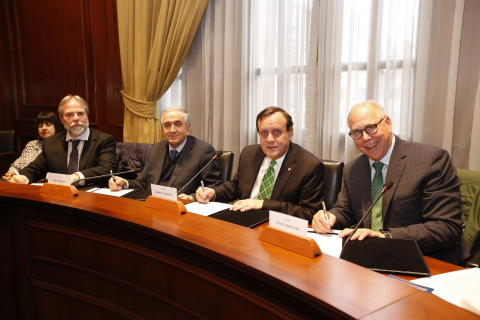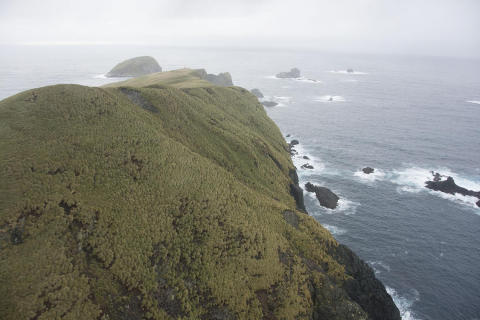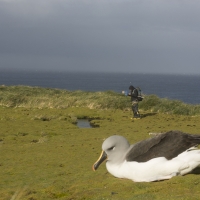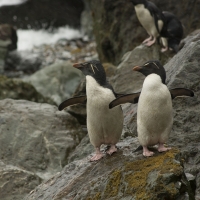The President of the Catholic University of Chile, Ignacio Sánchez welcomed the presidents of the University of North Texas, Dr. Neal Smatresk and the University of Magallanes, Dr. Juan Oyarzo, as well as the director of UNT's Sub-Antarctic Biocultural Conservation Program and the Institute of Ecology and Biodiversity, Dr. Ricardo Rozzi, to the Catholic University in Santiago, Chile, in order to consolidate a partnership strategy for the management of the future Sub-Antarctic Cape Horn Center.
This center for scientific excellence will be built in Puerto Williams, at the southern end of South America in the Cape Horn County and aims to become a national and international model for the long-term study of social sciences and ecology in the context of global climate change.
Within this framework, the participating institutions are committed to supporting the development and implementation of a working plan which will permit the sustainable operation of the Sub-Antarctic Cape Horn Center, to take on the challenges of management and logistics for scientific research and education, and to disseminate the results and recommendations to the region's public services and local community as part of a long-term and sustainable strategy that will serve as a model of innovation where science, conservation, and economic progress are successfully integrated.
Speaking about the consolidation of this working plan by the participating institutions, President Ignacio Sanchez explained that for the Catholic University this project is very valuable. "For the Catholic University this is a great opportunity to learn and also to acknowledge the efforts of scholars and students whose research creates an important body of work for further investigations and for teaching."
President Sánchez also emphasized the value of this project, and how it can foster progress in diverse fields. In addition, he stressed the importance of the relationship between the universities and the region. "It seems to us that this project is an extraordinary opportunity to consolidate research, teaching and training resources, and prospects for tourism, toward regional self-reliance in a remote area that has unique characteristics. For example, its culture, natural resources, and its people."
As well, Dr. Neal Smatresk, president of the University of North Texas, highlighted the value of this opportunity to collaborate with institutions that work to promote similar interests, such as eco-tourism, sustainability, the conservation of nature, and education, among others. "We, as a university, are committed to environmental philosophy and science, sustainable tourism, and the scientific capability to support this effort. Having visited Chile, I see a tremendous opportunity for collaboration. This will be as beneficial for us as educational institutions as it will be for Chile."
The president of the University of Magallanes, Dr. Juan Oyarzo, emphasized the opportunity borne from the willingness of the institutions to create partnerships, which will be crucial for the development of this and future projects. He also underscored the considerable opportunity to generate support for the communities served by the Center. "We must also consider how we serve the community with our research, by creating recreational activities, providing training and the teaching of languages, etc., it will all be hugely significant."
Finally, the President of the Institute for Ecology and Biology, Dr. Ricardo Rozzi thanked all of the participating institutions for their efforts and emphasized that within this framework, the future of this project is significantly promising. "Today we signed a letter of intent in which the three universities along with the Institute, unite to work toward the creation of a long-term and sustainable inter-institutional relationship."
Workshop about the contributions to the sustainable economic and social development of the region
The workshop entitled, "Challenges and opportunities for scientific centers who contribute to the sustainable economic and social development in the region" was held at the headquarters of Chilean Regional Universities in Santiago. It included the participation of the US Ambassador in Chile, along with the presidents of participating universities, government authorities, scholars, and related professionals. A diversity of themes were discussed related to the management and governing of centers of scientific research in Chile and the United States.
During the workshop, US Ambassador Carol Pérez emphasized that for her it was a privilege to be involved in this initiative, which can do so much good for international relations between Chile and the United States.
"The Sub-Antarctic Cape Horn Center offers us many possibilities for a bilateral relationship. For example, how do we promote a scientific relationship in areas which are of interest as much for Chile and for the United States and for the entire world; how do we strengthen the capabilities for the sustainable management of protected marine areas; and how should we work with the private sector to encourage economic development. Also, there is an opportunity to promote education in both English and in Spanish."
The panelists presented topics throughout the workshop, such as, "Science, Conservation and Sustainable Development in Cape Horn," led by Dr. Ricardo Rozzi, who is also the director of the Sub-Antarctic Biocultural Conservation Program; "From astronomy to ecotourism with a hand lens: an international collaboration of scientific centers in Chile," led by Ambassador Carol Pérez; "Natural laboratories in Chile and effects of the interdisciplinary research program at Cape Horn," led by Dr. José Miguel Aguilera, Professor Emeritus in Engineering, Catholic University.
The workshop closed with a panel discussion entitled, "Linking Science, the State, and Sustainable Enterprise," which included members of the private sector, government authorities, and scholars. Participants at this discussion included the governor of the Antarctic Province of Chile, Juan José Arcos, the executive director of the Image of Chile Foundation, Myriam Gómez, the president of the Federation of Southern Fishing Industry, Carlos Vial, and the Manager of CTR Regional Telecommunications Company, Iván Rodriguez.
It is important to note that the University of Magallanes has led the effort to create the Sub-Antarctic Cape Horn Center, a facility that will allow for the development of research in socio-ecology, environmental ethics, and conservation in relation to ecotourism in one of the recognized World Biosphere Reserves and which aspires to become an international center dedicated to the foundation for human endeavor with specializations in ecology and sustainable tourism, to the welcoming of both local and international visitors to the southernmost biosphere reserve, and to encouraging globally renown research on the Sub-Antarctic.
Translated from Spanish. Original written by Maximiliano Monsalves, Director of Communications at Catholic University, Chile.







